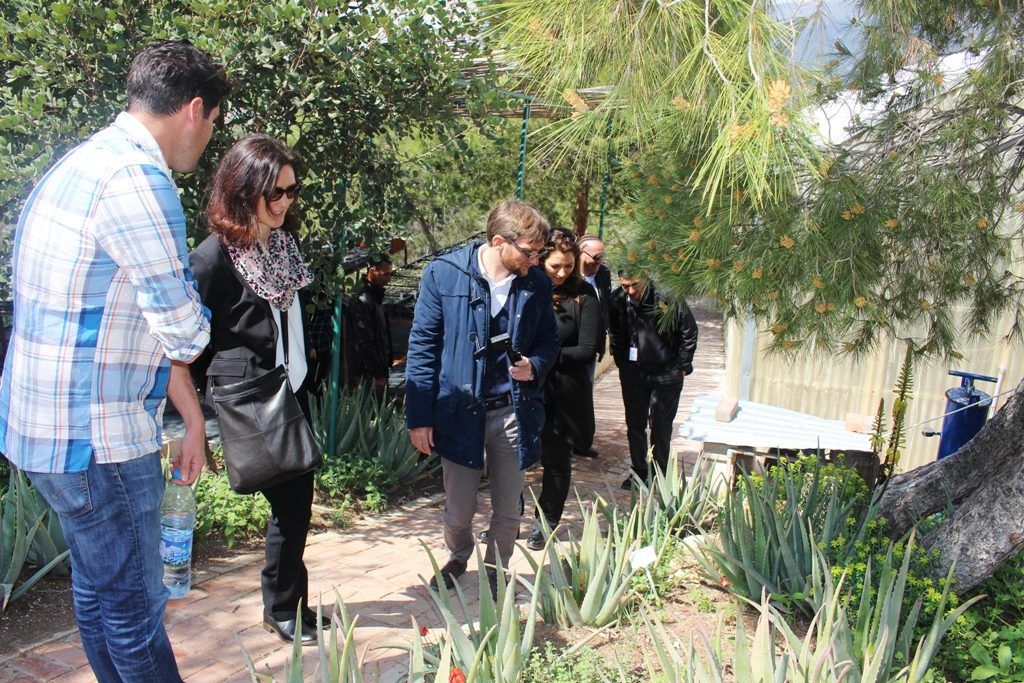ENPI CBC MED Project Visits in Jordan and Palestine
For the first time ever in the history of cross-border cooperation, a joint mission was organised mid-March 2017 between the ENPI/ENI MED CBC programme, the European Commission (the Directorate General in charge of Neighbourhood Policy – DG NEAR) and EU officials from the Delegation in Jordan and the European Union Office for the West Bank and Gaza Strip to visit ENPI CBC MED funded projects in Jordan and Palestine.
“Energy efficiency, waste management, sustainable tourism, social inclusion, etc. Cross-border cooperation in the Mediterranean addresses multifaceted issues but is characterised by the same approach: men and women working together to make an impact on both sides of the Mediterranean Sea” underlines Martin Heibel, communication manager of the ENPI CBC Med Programme.
To understand how these collaborations between member states and EU neighbouring countries work on the ground, various projects had been selected by the programme Managing Authority. These projects dealt with different topics: fighting against poverty thanks to sustainable agriculture under the SIDIG-MED project at the Royal Botanic Garden in Jordan; supply of solar energy for a hospital in Palestine and a university in Jordan through the MED-SOLAR and DIDSOLIT-PB projects ; a waste sorting project, named SCOW, in Palestine; and finally a concept of a community-based hotel in Bethlehem with the FOP project. All these projects have been developed and implemented by organisations established in various Mediterranean countries and by working in partnership. In the context of the ENI CBC MED programme, eligible organisations from member states and EU neighbouring countries join forces to identify common challenges and address them with joint solutions. Citizens, researchers, students, entrepreneurs and many more come together to share know-how, experience, expertise and implement pilot actions in various regions around the Mediterranean sea basin.
“It’s been great to see on the ground the tangible results of inspiring cooperation stories which were made possible thanks to the strong commitment of all partners involved. Even in a fragile context like the Mediterranean region, projects eventually delivered results. This is very encouraging for the new programme” adds Mr. Heibel.
Cooperation across borders is a central element of these projects which have had a great impact on the local population in the countries and the regions themselves and generated a feeling of cohesion in the Mediterranean basin.
So far, EU delegations have had a minor role in the follow-up of CBC projects. However, all parties agree that this needs to change.
“For us, in the European Commission, and for the Managing authorities, it is extremely important to have EU delegations on board. CBC projects are implemented in member states and EU neighbouring countries. EU delegations are thus key partners, in particular when it comes to strengthening the visibility of ENI CBC projects in the concerned neighbouring countries and to building synergies between projects funded under different cooperation instruments. This mission was a first step to raise awareness and reinforce the links between the MA and EU delegations/office on the field. And in this sense, the mission was a real success.” says Vanessa De Bruyn, from DG NEAR.
EU delegations have clearly in depth knowledge of the country and of the projects supported under the bilateral assistance. Their expertise and feed-back are very valuable to ensure synergies and complementarity with cross-border cooperation projects. In the EU delegation to Jordan, Francesca Aquaro has been appointed as a CBC contact point. “The visits were extremely useful for me to understand how these projects function. I will now be able to assist the Managing Authority by conducting field visits for example, when necessary.” Says Francesca.
DG NEAR has asked all EU delegations concerned to appoint a CBC contact point. This is now a new era where cooperation between Managing Authorities, EU delegations and the European Commission headquarters will ensure synergies and visibility of this unique type of cooperation between countries and regions at the EU’s external borders.
For more information on the projects visited and the media coverage, please see the link here.
